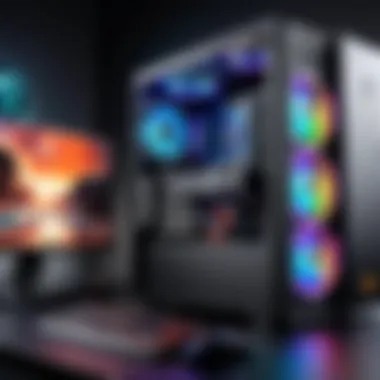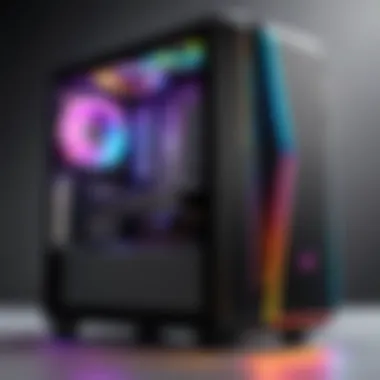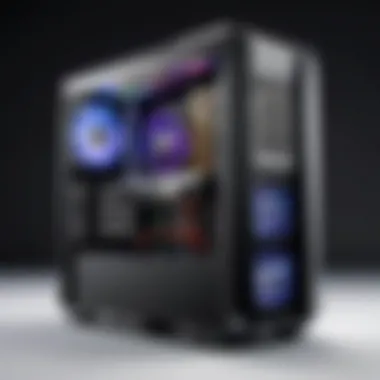Top 5 Prebuilt Gaming PCs: Expert Reviews & Insights


Intro
In today's fast-paced gaming landscape, the demand for high-performance prebuilt gaming PCs continues to rise. These systems cater to a broad spectrum of users, from casual gamers looking for seamless gameplay to hardcore enthusiasts wishing to experience cutting-edge graphics and speed. The convenience offered by prebuilt rigs eliminates the often overwhelming process of selecting and assembling individual components. This article presents an incisive analysis of the top five prebuilt gaming PCs on the market, evaluating them based on performance, component quality, design features, and price.
Every gamer has unique requirements, and understanding what different systems offer can be instrumental in making an informed choice. From light gaming to high-octane esports, the options can be quite extensive. Our goal is to simplify that decision-making process by providing detailed evaluations, thereby helping you to find the right system tailored to your gameplay style and budget.
Performance Metrics and Specifications
When choosing a gaming PC, performance is paramount. Thus, we will delve into key specifications such as CPU prowess, GPU capabilities, and RAM configurations. The analysis ensures that you can grasp how these factors translate into real-world gaming experiences.
Component Quality and Build
The build quality of a gaming rig significantly impacts longevity and overall user satisfaction. Whether it's the materials used or the design's ergonomics, we will clarify how these elements affect your gaming setup.
Design Features
Design trends in gaming PCs have evolved dramatically. We'll explore aesthetic aspects, casing designs, and any additional features like RGB lighting that enhance the gaming experience.
Price Consideration
Budget is critical when selecting a prebuilt PC. We will evaluate the cost of each contender, ensuring to highlight where you can get the most bang for your buck.
Target Audience
This article caters to a mix of readers. Whether you are a newcomer to gaming or a professional gamer looking to upgrade, we aim to provide insights that match your expectations.
Culmination
Navigating the world of prebuilt gaming PCs need not be a daunting task. By synthesizing and comparing the most relevant information, you can confidently choose a system that meets your needs. Stay tuned as we delve deeper into each of the top contenders, weighing their pros and cons meticulously.
Intro to Prebuilt Gaming PCs
Prebuilt gaming PCs are increasingly relevant in today’s gaming landscape. They offer a streamlined alternative for individuals who want to jump directly into gaming without the hassle of assembling their own systems. This article explores the significance of prebuilt systems, examining their place in the market and the value they provide to consumers.
Defining Prebuilt Gaming PCs
Prebuilt gaming PCs refer to fully assembled computer systems tailored for gaming out of the box. These systems include all necessary components, such as the central processing unit, graphics card, memory, and storage, pre-installed in a case. The value of prebuilt gaming PCs lies in their convenience; users are not required to have deep technical knowledge or invest time in building a system from scratch. This also frees gamers from the often daunting process of component compatibility checks, assembly, and troubleshooting.
As a product, prebuilt systems vary widely in performance and price. High-end variants cater to enthusiasts, delivering superior gaming experiences, while budget-friendly models serve casual gamers without a hefty investment. Thus, understanding this concept is fundamental when exploring the top five prebuilt gaming PCs available today.
The Growing Demand for Prebuilt Systems
In recent years, there has been a noticeable shift in consumer preferences towards prebuilt gaming PCs. This trend is largely a response to several factors, including the increasing complexity of gaming technology and the pandemic-driven surge in online gaming. Consumers, particularly those new to gaming, may feel overwhelmed by the demands of building a system. Consequently, prebuilt PCs present a practical solution, allowing them to acquire powerful machines ready to handle current gaming titles.
Additionally, the limited availability of components for custom builds has influenced this demand. Factors such as supply chain disruptions have made it challenging for hobbyists to source parts at reasonable prices. Prebuilt systems often provide better value as manufacturers leverage bulk purchasing power, making them more appealing to a broader audience.
Ultimately, the rising interest in esports and the expansion of gaming communities have accelerated the need for reliable and accessible gaming solutions. Prebuilt gaming PCs have become a key player, bridging the gap between gaming aspirations and practical access to high-quality systems.
Criteria for Choosing a Prebuilt Gaming PC
Choosing a prebuilt gaming PC is not simply about aesthetics or price; it involves a deep dive into several critical factors that can significantly impact the gaming experience. Understanding these criteria helps prospective buyers align their needs and budget with the right system. This section covers the fundamentals that every gamer should consider when selecting a prebuilt gaming PC, focusing on performance, build quality, and cost-effectiveness.
Performance Specifications
Performance specifications are arguably the most vital aspect of any gaming PC. Why is this important? The right performance specs ensure smooth gameplay, which enhances overall enjoyment. Here, we will break down the main components that determine a PC's performance.
CPU
The CPU, or Central Processing Unit, plays a significant role in processing game data and executing tasks. A good CPU can efficiently handle multiple tasks simultaneously, which is crucial for gaming, especially for demanding titles. Popular choices include Intel Core i7 and AMD Ryzen 7. These processors provide a balance of high clock speed and core count, making them favorable for both gaming and multitasking. However, some CPUs can become outdated quickly, limiting the lifespan of a prebuilt system.


GPU
The GPU, or Graphics Processing Unit, is central to any gaming experience. It is responsible for rendering graphics and ensuring that games look good and run smoothly. High-performance GPUs like the Nvidia GeForce RTX 3080 allow gamers to experience high frame rates and resolutions. A powerful GPU is often the first consideration when buying a gaming PC, as it directly correlates with visual quality and gaming performance. However, they can be considerably more expensive, affecting the overall budget.
RAM
Random Access Memory, or RAM, is essential for smooth gameplay and multitasking. Most modern gaming PCs come with at least 16GB of RAM, which is sufficient for most games. Higher RAM allows for better performance when running multiple applications, like streaming while gaming. However, excessive RAM beyond what is needed may not significantly improve performance and could waste resources.
Storage
Storage options, including SSDs and HDDs, affect load times and game performance. SSDs, such as the Samsung 970 EVO, are much faster than traditional hard drives, reducing loading screens and improving responsiveness. A combination of SSD and HDD is often ideal; SSD for essential games and HDD for large libraries. However, not having enough storage can lead to frustration, especially for gamers with extensive collections.
Build Quality and Design
The build quality and design of a prebuilt gaming PC can influence longevity and performance. A well-built system is more durable and resistant to overheating, ensuring more consistent performance over time.
Chassis Design
The chassis design not only impacts aesthetics but also airflow and component accessibility. A good chassis design, like that of the NZXT 10, provides sufficient airflow and space for future upgrades. Gaming PCs with poor design can lead to overheating, limiting performance. It's also important to consider cable management, as a cluttered interior can affect airflow.
Cooling Systems
Effective cooling systems play a crucial role in maintaining performance. High-quality cooling solutions, such as AIO liquid coolers, can enhance thermal performance, especially during intensive gaming sessions. While stock cooling might suffice for less demanding users, serious gamers should prioritize upgraded cooling systems to prevent thermal throttling and ensure stable performance.
Price vs. Performance Ratio
Evaluating the price-to-performance ratio is essential for making an informed decision. This ratio helps determine whether the features offered justify the cost. Sometimes, buyers may find themselves paying more for branded systems without significantly better performance. Understanding the specs and comparing them across different models allows gamers to find the best deal for their needs. Therefore, a careful examination of specifications against price is fundamental to achieving value in a prebuilt gaming PC.
Overview of the Top Prebuilt Gaming PCs
In the realm of gaming, selecting the right prebuilt PC is crucial. This section provides an insight into the current top five options available in the market, focusing on their unique characteristics and overall value propositions. This examination aids readers in grasping the strengths and weaknesses of each model discussed in this article.
These prebuilt systems cater to diverse gamer needs, whether one seeks high performance for the latest titles or a budget-friendly solution for casual play. They also save time and effort, which is appealing for those who might otherwise consider building a system from scratch.
Understanding the specific attributes of each top model can significantly influence your gaming experience and long-term satisfaction.
PC One: High-End Gaming Experience
Key Features
The first PC reviewed offers a powerful gaming experience. It features a top-of-the-line CPU, known for its speed and efficiency. Coupled with a high-end graphics card, this configuration enables seamless gameplay even on demanding titles. A notable characteristic of this system is its extensive cooling setup, which ensures optimal performance during long gaming sessions. This trait is particularly beneficial for maintaining component longevity.
Performance Analysis
In performance tests, this PC stood out. It handles modern games at ultra settings while maintaining a stable frame rate. This is a common requirement for enthusiasts aiming for immersive experiences. However, it does require a significant investment, which can be a downside for budget-conscious gamers.
Price
The price point is reflective of its premium components. While it is more expensive than average models, the investment translates into superior gaming capabilities. This is a worthwhile consideration for serious gamers who demand high fidelity graphics and performance. However, it's essential to assess if such expenditure aligns with individual gaming habits.
PC Two: Best Value for Gamers
Key Features
The second option is tailored for those who want excellent value. It balances performance and affordability effectively. Significant features include a solid GPU and ample RAM, facilitating smooth gameplay across various genres. The build quality is remarkable for its price range. What's appealing is the inclusion of RGB lighting, enhancing aesthetic charm without inflating cost.
Performance Analysis
This PC delivers reliable performance. It performs well in benchmarks, aligning closely with higher-priced models in gaming scenarios. It achieves high settings in popular titles, proving itself a solid choice for both casual and competitive gaming. However, it may lack the top-tier performance seen in the highest-end options, which is a trade-off.


Price
The pricing model makes this PC an attractive choice. Offering robust features at a competitive price promotes it as a leading option among budget-conscious buyers. However, it's important to compare features against others in its category to ensure it meets specific gaming needs.
PC Three: Compact Gaming Solution
Key Features
Third in line, this compact model is designed for limited spaces without sacrificing performance. It features a compact chassis which houses powerful components while ensuring thermal efficiency. A unique aspect is its modular design, allowing easy upgrades without complex disassembly. This flexibility is a strong selling point for those who anticipate future enhancements.
Performance Analysis
This PC excels in performance testing for compact systems. Even in demanding conditions, it maintains stability. A highlight is its ability to run popular games at medium to high settings, presenting a valid option for gamers needing a smaller footprint. However, it does face limitations in extreme performance scenarios.
Price
Its pricing reflects its design philosophy, making it more affordable than some high-performance models. This makes it appealing for users who want decent performance in a compact size. Yet, potential buyers should consider the implications of compact designs, including potential thermal restrictions under heavy loads.
PC Four: Customizable Features
Key Features
The fourth PC stands out due to its customization options. Gamers can adjust various components, from storage solutions to cooling systems. This adaptability allows users to tailor the system according to their specific gaming styles. Importantly, it often includes open slots for additional upgrades, future-proofing the investment.
Performance Analysis
In terms of performance, this system holds its ground effectively in mid-range gaming scenarios. It yields satisfactory results at high settings for most titles. However, the performance can vary significantly based on the configuration choices made during the setup. This presents both an opportunity and a challenge for users.
Price
The price reflects the balance between customizable features and performance. It provides a flexible cost structure, as users can choose how much to invest based on their preferences. However, the variability in pricing can be confusing for consumers, making it necessary to clearly understand options before purchase.
PC Five: Budget-Friendly Option
Key Features
Lastly, the budget-friendly option offers essential features for entry-level gaming. It includes a decent GPU and sufficient RAM for handling less demanding titles. What’s noteworthy is its simplicity and ergonomic design, appealing to newcomers to PC gaming.
Performance Analysis
Performance is modest but consistent. It can efficiently run popular games on lower settings, making it an ideal choice for casual gamers or those new to the platform. However, it does not cater well to high-performance gaming, which is a clear limitation.
Price
This PC is affordable, making it accessible. It provides basic gaming options without extensive financial commitment. However, buyers should be aware of potential limitations in future upgrades and overall gaming experiences, ensuring their expectations align with the product capabilities.
Comparative Analysis of Features
The comparative analysis of features is a critical component of selecting a prebuilt gaming PC. In a marketplace saturated with options, understanding how these systems stack up against one another helps consumers make informed decisions. Each prebuilt PC comes with its unique set of characteristics that appeal to specific user needs and preferences. Therefore, a thorough analysis will evaluate performance, usability, and price, giving potential buyers a clearer picture of what to expect from their investment.
When assessing gaming computers, there are various aspects to consider:
- Component Quality: The interplay of hardware can significantly affect overall performance.
- User Experience: How intuitive is the setup? Are there any usability challenges that could frustrate gamers?
- Value Proposition: Does the system provide good performance relative to its cost?
This analysis not only illuminates the strengths and weaknesses of each model but also aids in aligning these with users' specific gaming goals.
Performance Benchmarking
Performance benchmarking serves as an essential tool for evaluating the capabilities of prebuilt gaming PCs. It entails a systematic approach to testing each system’s hardware under various conditions. These benchmarks highlight the machines' performances across multiple gaming genres, shedding light on how they handle demanding applications.


For instance, analyzing frame rates across popular games provides insights into the gaming experience that one can expect. Systems can be compared based on:
- Graphics Performance: The efficiency of the GPU in rendering high-quality images.
- CPU Performance: The capability of the processor to handle complex tasks and multitasking environments.
- Storage Speeds: The read and write speeds of SSDs versus traditional HDDs, which affects load times.
In the realm of competitive gaming, such performance metrics are invaluable as they can sway the decision for serious esports competitors who require the best machinery to ensure minimal lag and maximum responsiveness.
User Experience and Usability
User experience transcends mere technical specifications, incorporating the overall feel and functionality of the gaming PC. It covers how easy it is to set up the system, the quality of customer support, and the aesthetics of the design. A well-constructed PC can be incredibly rewarding to interact with.
Key aspects that enhance user experience include:
- Accessibility of Ports and Slots: Easy access to USB ports, audio jacks, and expansion slots can significantly streamline the user experience.
- Thermal Management: Effective cooling solutions not only prolong the life of components but also quiet the operation, enhancing comfort during long gaming sessions.
- Software Functionality: Preloaded applications or operating system configurations that are intuitive can substantially improve the initial user experience.
As gaming becomes a more immersive experience, the comfort and reliability of the system become paramount. Considering these attributes during the comparative analysis ensures that users are not only satisfied with performance but also with how the system integrates into their lifestyle.
Pros and Cons of Prebuilt Gaming PCs
In evaluating prebuilt gaming PCs, understanding the pros and cons is essential for anyone considering a purchase. Prebuilt systems offer an alternative to custom builds, catering to various gamers with distinct needs and preferences. This section dives into the advantages and disadvantages of prebuilt gaming PCs, enabling readers to make informed choices based on their unique gaming requirements.
Advantages Over Custom Builds
Choosing a prebuilt gaming PC has several notable advantages. One of the primary benefits is convenience. Gamers can purchase a fully assembled system without the need for technical skills or the hassles of sourcing individual components. For those who prioritize immediate gameplay over the complexities of assembling a computer, this is a significant factor.
Another advantage is the warranty often associated with prebuilt systems. Companies like Alienware or CyberPowerPC provide complete warranties on their products, which can reduce the risk associated with hardware failures over time. This means that tech support is generally just a call away.
Prebuilt gaming PCs often feature optimized hardware compatibility. Manufacturers typically conduct rigorous testing to ensure that all components work harmoniously together. This is unlike custom builds, where selecting the wrong combination of parts can lead to compatibility issues and performance bottlenecks.
Additionally, prebuilt systems may come with dedicated customer support services. This support can be invaluable, providing users with assistance for installation, setup and troubleshooting. Here are some key benefits of choosing a prebuilt gaming PC:
- Immediate availability for gaming without the wait
- Professional warranties and support from reputable manufacturers
- Compatibility assurance and rigorous pre-release testing
- Often ready for play right out of the box without additional setup
Potential Drawbacks
Despite the advantages, prebuilt gaming PCs are not without their drawbacks. One of the primary concerns is the price. Generally, prebuilt systems may carry a premium compared to building a PC from scratch. This extra cost comes from the convenience and support they provide, but may not always justify the price for every budget-conscious gamer.
Customization options can also be limited. Many prebuilt gaming PCs offer a standard set of specifications, which might not suit every individual’s gaming style or needs. Enthusiasts looking for specific components or configurations may find the restrictions frustrating. The ability to choose particular GPUs, CPUs, and cooling solutions is often sacrificed for the sake of convenience.
Another consideration is the perceived quality of parts. Some manufacturers may cut costs by including lower-quality components in certain models. Though the system as a whole might perform well, individual components like power supplies or motherboards may not meet the standards expected by dedicated gamers.
Lastly, upgradability may pose a challenge. While custom builds allow gamers to replace outdated parts easily, prebuilt systems might have proprietary designs that limit future upgrades. Here are some potential drawbacks of prebuilt gaming PCs:
- Higher price point compared to custom builds
- Limited customization options based on model
- Potentially lower quality in some parts
- Possible challenges with future upgrades
In summary, prebuilt gaming PCs present a mixed bag of advantages and drawbacks. Depending on individual preferences and priorities, prospective buyers must weigh these factors carefully to find the right gaming solution for their needs.
Finale and Final Recommendations
In an era where gaming has evolved into a significant form of entertainment and competitive engagement, choosing a prebuilt gaming PC becomes increasingly crucial. This article has analyzed five leading gaming PCs with a focus on performance, design, and usability. As you think about your next gaming system, consider how the choices outlined in this analysis affect your overall gaming experience.
Summary of Top Picks
Each of the five systems discussed caters to different needs and preferences. Here’s a brief recap:
- PC One: High-End Gaming Experience focuses on unrivaled graphics and speed, making it ideal for enthusiasts who demand the best.
- PC Two: Best Value for Gamers provides a balanced mix of performance and price, suitable for those who want quality without breaking the bank.
- PC Three: Compact Gaming Solution offers a powerful experience in a small footprint, perfect for limited spaces.
- PC Four: Customizable Features allows users to tailor their settings for a more personalized gaming journey.
- PC Five: Budget-Friendly Option delivers solid performance at a lower cost, proving you don’t need to spend a lot to enjoy great gaming.
This summary highlights the distinct characteristics of each prebuilt system, ensuring that you can find a machine that aligns well with your gaming aspirations.
Considerations for Future Purchases
When purchasing a gaming PC, several factors should always be in mind:
- Intended Use: Define the primary purpose of the gaming PC. Casual gaming requires different specs compared to competitive gaming.
- Upgradability: Consider the potential for future upgrades in terms of RAM, storage, and graphics cards. A system that allows for enhancements provides longevity.
- Warranty and Customer Support: Building trust with the manufacturer through reliable customer service and warranty options can save you headaches in the long run.
- Community Reviews: Look for information on forums like Reddit or social media from other users. This can provide insights that might not be in the specifications.
"Purchasing a prebuilt gaming PC is not just about the components; it's about how those components work together to provide a seamless experience."



